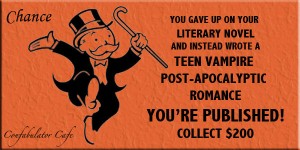 Twenty some years ago, I thought I wanted to be a writer. I went to college to get an English degree. I spent my free time penning bad poetry and worse short stories. And after college I started a few book-length manuscripts that ultimately went nowhere. Somewhere along the line, I decided I might be missing some essential bit of writer knowledge, so I sought out a writing workshop at my local community college.
Twenty some years ago, I thought I wanted to be a writer. I went to college to get an English degree. I spent my free time penning bad poetry and worse short stories. And after college I started a few book-length manuscripts that ultimately went nowhere. Somewhere along the line, I decided I might be missing some essential bit of writer knowledge, so I sought out a writing workshop at my local community college.
The results were disastrous.
First, let me tell you straight up that what I was hoping to get from the workshop was praise. I didn’t want advice. I wanted people there to read my work and tell me I was the best thing since Ernest Hemingway. Alas, it was not to be.
Instead, I received very harsh criticism that I thought was erroneous and unfair. Other attendees were ignoring my bold plot lines and unique characters. Instead, they were focusing on mechanics that I had apparently failed to master in college. I was crushed.
All that was minor compared to the keynote speech given by Diana Gabaldon, the author of Outlander (back then, it wasn’t yet a series). She said something (to the audience, not to me directly) that I have never forgotten.
She said that if you want to get published, you have to write what sells. Not art, not the great American novel, not the story that has been burning inside waiting to escape from your heart to your pen. None of that. Just write what sells.
I was aghast. Maybe I shouldn’t have been. This workshop was — if memory serves — sponsored by the local chapter of some romance writers guild. And the author in question was a writer of a best-selling historical romance. Nevertheless, I was shocked to hear that my dream of being published might be predicated on the idea that I would have to “sell out” and write something that was commercial.
That workshop did three things: 1) It set back my writing career by several years, 2) it forced me to confront the notion that — good grades or not — maybe I didn’t get the best education in college, and 3) it made me consider the idea that the publishing industry was a business.
Side note: When I attended my next writers workshop in 1999, I did so much more humbly and with an eye on getting better rather than getting accolades.
Even though the workshop crushed my ego and made me question my decision to be a writer, I can now appreciate — some 20 years later — what Ms. Gabaldon was trying to say.
Writing is an art. Publishing is a business. If you are lucky enough to get published, you’ve entered the business side of writing (and the job is not a very well paying one). If you’re going to focus on getting published, it might be helpful to write something that has some commercial possibility.
Now that I’ve accepted this truth, I’d like to offer some advice based on my experiences. To up-and-coming writers who are interested in being published:
- Know your genre — Read what’s hot. Read what is getting critical praise, but no one seems to be reading. Read some things that are awful. Find out what works and what doesn’t. You can’t write if you don’t read. Read a lot.
- Know your competition — Find authors who are writing in the same genre as you. Narrow down the list to a few authors who write in a similar style to you. Follow their progress and learn from them.
- Know the publishing industry — It pays to understand publishing. Is YA the only genre agents want to read? Are vampires and werewolves out? You need to know what sells, but remember that doesn’t mean you have to write it.
- Know when you’re ready — As tough as this is for you to hear, you may not be ready for publication yet. That’s okay. You just need to get better. And you will. Give it time. Keep writing. Keep learning. When you start spotting the mistakes in your older stories, you’ll know you’ve improved. Keep practicing until you’re ready.
I graduated from college in 1990 with a degree in English. Since then, I have written some horrible stuff. I’ve also written some good stuff that I couldn’t get published. Every year, I get better. It has taken 20 years, but I’m finally starting to think I may be ready.
Leave a Reply